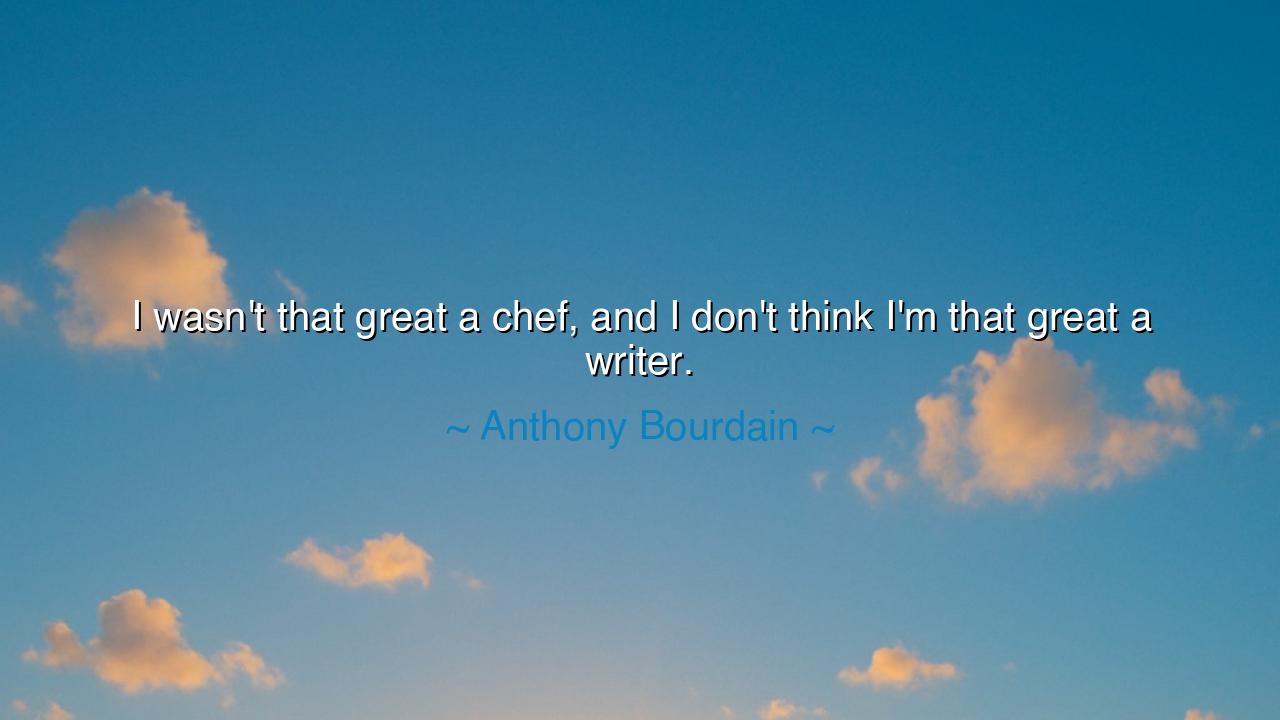
I wasn't that great a chef, and I don't think I'm that great a






The late Anthony Bourdain, a wanderer of both kitchen and world, once said with characteristic humility: “I wasn’t that great a chef, and I don’t think I’m that great a writer.” At first glance, these words seem modest—perhaps even self-deprecating. But beneath their simplicity lies a deeper truth, a lesson as profound as any philosophy written in ancient stone: greatness is not born of perfection, but of authenticity. Bourdain’s legacy, spanning continents and cultures, was not built on flawless mastery, but on his relentless honesty—his courage to be human in a world obsessed with idols.
Bourdain’s journey began in the chaos of restaurant kitchens, where heat, noise, and exhaustion forge men and women into warriors of craft. He rose from line cook to executive chef, but it was not his technique that made him immortal—it was his ability to see beyond the plate. His book Kitchen Confidential, written with raw candor and poetic grit, pulled back the curtain on the underworld of the culinary profession. Yet even as it made him famous, Bourdain would say, “I don’t think I’m that great a writer.” In those words resounds a paradox known to all true creators: the closer one comes to truth, the less one feels like a master. For mastery without humility is arrogance, but humility before creation is wisdom.
To say, “I wasn’t that great a chef,” is not to diminish his skill, but to honor something greater—the spirit of continual learning. Bourdain knew that in art, as in life, there is no final summit. The world is too vast, its flavors too infinite, for any one person to claim dominion over them. This humility was his strength. He walked through the markets of Morocco, the jungles of Vietnam, and the streets of Mexico not as a conqueror, but as a student. Every meal, every story, every face he met became a lesson in humanity. Through this openness, he transcended his craft and became what few ever do: a bridge between worlds.
His quote reminds us of an ancient truth once spoken by Confucius, who said, “Real knowledge is to know the extent of one’s ignorance.” The wise do not proclaim greatness—they live in the pursuit of it, knowing it can never be fully attained. So too did Bourdain live: restless, searching, curious. His humility did not weaken him; it elevated him. For while others sought to be great, he sought to be real—and in that authenticity, he became something rarer than greatness itself: he became human in full.
Consider the story of Leonardo da Vinci, whose genius reshaped the world, yet who died still calling himself an “apprentice of nature.” Like Bourdain, Leonardo’s humility was not self-denial but reverence for the infinite. He understood that the more one sees, the less one knows. Bourdain’s life reflected this same eternal humility—the awareness that the world is too rich for any one soul to master, but not too vast for one to love. That love—for people, for culture, for food—was the pulse that made his work unforgettable.
Thus, Bourdain’s words carry a message for all who labor in pursuit of art, craft, or understanding: Do not seek to be the best—seek to be true. Greatness will come not from claiming mastery, but from giving yourself wholly to the work, to the moment, to the experience. The world does not remember those who called themselves great—it remembers those who touched others by being real, imperfect, and brave enough to show it.
The lesson is simple yet eternal: humility is not the denial of worth, but the recognition that growth never ends. Practical action: wherever you stand—in your art, your work, or your dreams—do not measure yourself by comparison or praise. Instead, devote yourself to curiosity. Learn, listen, wander. Speak honestly of what you do not know, and let that honesty be your strength.
For in the end, Bourdain’s quiet confession—“I wasn’t that great a chef, and I don’t think I’m that great a writer”—becomes an act of greatness itself. It reminds us that legacy is not built on flawless skill, but on fearless truth. And so, when your own journey feels small or incomplete, remember his spirit: to walk humbly, to speak honestly, and to live with such passion that your imperfection becomes its own kind of perfection.






AAdministratorAdministrator
Welcome, honored guests. Please leave a comment, we will respond soon